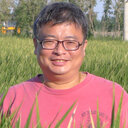Shikonins, phytocompounds from Lithospermum erythrorhizon, inhibit the transcriptional activation of human tumor necrosis factor alpha promoter in vivo.
Açar sözlər
Mücərrəd
Tumor necrosis factor alpha (TNF-alpha) contributes to the pathogenesis of both acute and chronic inflammatory diseases and has been a target for the development of new anti-inflammatory drugs. Shikonins, the naphthoquinone pigments present in the root tissues of Lithospermum erythrorhizon Sieb. et Zucc. (Boraginaceae), have been reported to exert anti-inflammatory effects both in vitro and in vivo. In this study, we evaluated the effects of shikonin and its derivatives on the transcriptional activation of human TNF-alpha promoter in a gene gun-transfected mouse skin system by using a luciferase reporter gene assay. The crude plant extract of L. erythrorhizon as well as derived individual compounds shikonin, isobutyryl shikonin, acetyl shikonin, dimethylacryl shikonin and isovaleryl shikonin showed significant dose-dependent inhibition of TNF-alpha promoter activation. Among the tested compounds, shikonin and isobutyryl shikonin exhibited the highest inhibition of TNF-alpha promoter activation and also showed significant suppression of transgenic human TNF-alpha mRNA expression and protein production. We demonstrated that shikonin-inhibitory response was retained in the core TNF-alpha promoter region containing the TATA box and a 48-bp downstream sequence relative to the transcription start site. Further our results indicated that shikonin suppressed the basal transcription and activator-regulated transcription of TNF-alpha by inhibiting the binding of transcription factor IID protein complex (TATA box-binding protein) to TATA box. These in vivo results suggest that shikonins inhibit the transcriptional activation of the human TNF-alpha promoter through interference with the basal transcription machinery. Thus, shikonins may have clinical potential as anti-inflammatory therapeutics.


